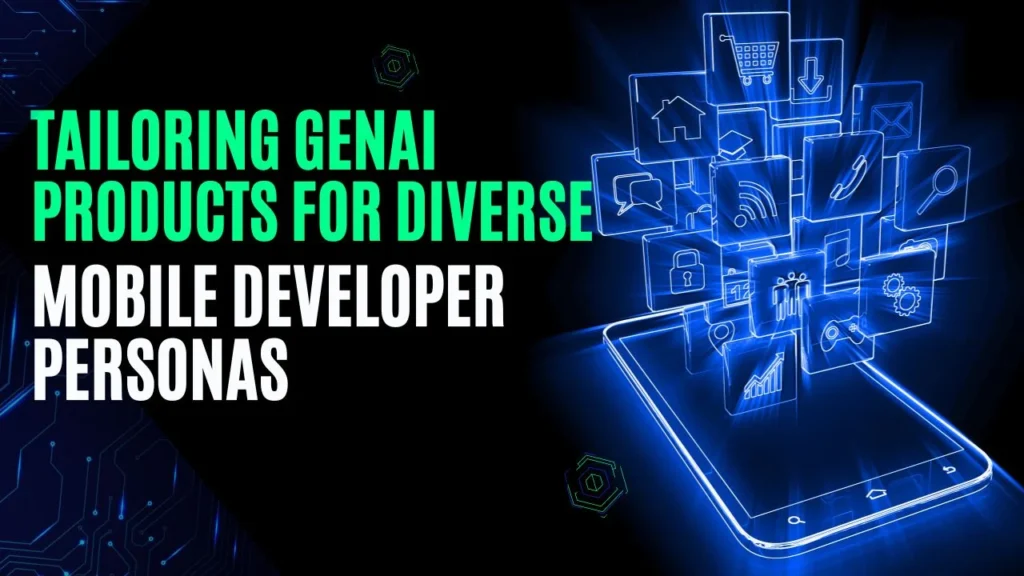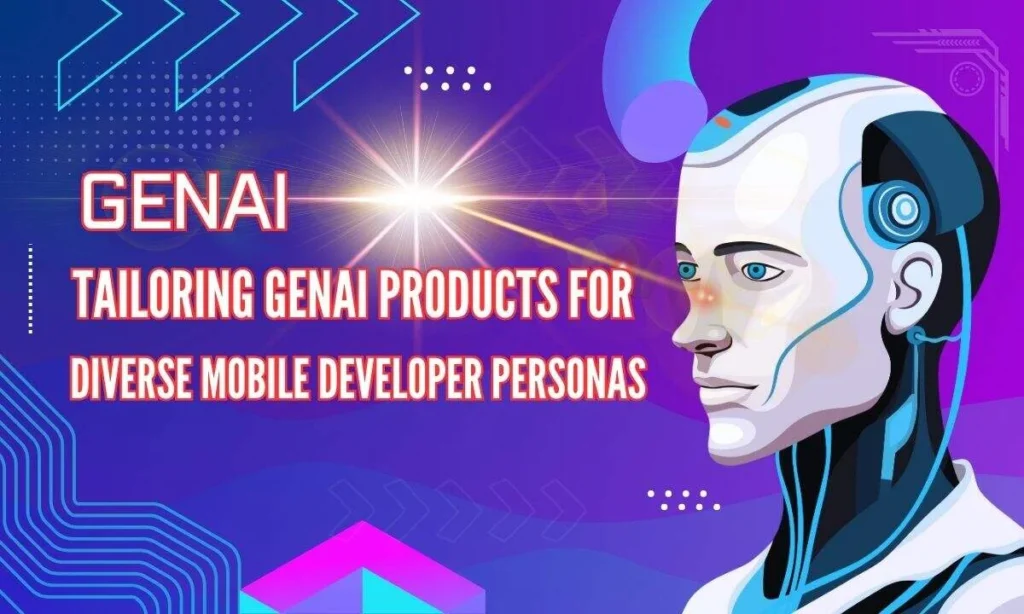Discover how tailoring GenAI products for diverse mobile developer personas enhances efficiency, productivity, and innovation. Learn strategies to meet varied developer needs effectively.
Introduction
The mobile development landscape is vast and varied, with developers coming from different backgrounds, skill levels, and specialties. As artificial intelligence (AI) tools continue to evolve, one area gaining significant attention is Generative AI (GenAI) for mobile app development. Tailoring GenAI products for diverse mobile developer personas can drive innovation, productivity, and efficiency, making these tools accessible and useful to a broader range of developers.
In this article, we’ll explore the importance of creating GenAI tools that cater to diverse developer personas, how to align AI solutions with specific needs, and the benefits of a personalized approach. By understanding these personas and adjusting GenAI products accordingly, companies can help mobile developers overcome challenges and maximize their potential.
What Are GenAI Products?
Generative AI (GenAI) products use machine learning models to generate new content, such as code, designs, or even entire applications. In the context of mobile development, GenAI tools can streamline coding, automate repetitive tasks, create UI designs, and suggest solutions to common problems. From writing code snippets to generating entire layouts, these products can greatly enhance the workflow of mobile developers.
GenAI tools can be tailored to the specific tasks of mobile development, but not all developers use these tools the same way. Hence, understanding their unique needs and customizing GenAI solutions for different developer personas is essential.
Understanding Diverse Mobile Developer Personas

Mobile developers are not a monolithic group. They come from different backgrounds, have varying levels of experience, and work in a range of industries. These differences create diverse personas, each with unique needs when it comes to AI-powered tools. When tailoring GenAI products for diverse mobile developer personas, it’s essential to break down the primary categories of users:
1. The Junior Developer
- Profile: Typically new to mobile development, often with limited coding experience.
- Challenges: Lacks confidence in solving complex issues, requires guidance and educational resources.
- GenAI Needs: Simplified, step-by-step code suggestions, templates for app structures, and tutorials that allow them to learn while building.
2. The Experienced Developer
- Profile: Developers with a few years of experience, proficient in mobile development.
- Challenges: Focuses on efficiency, code optimization, and solving more complex problems.
- GenAI Needs: Advanced code completion, debugging suggestions, performance optimization tips, and tools that integrate into existing workflows seamlessly.
3. The Designer-Developer Hybrid
- Profile: These developers often blend both coding and design skills to create mobile apps that are visually appealing and user-friendly.
- Challenges: Balancing functionality with aesthetics, often switching between design and code tools.
- GenAI Needs: GenAI tools that can bridge the gap between design and development by generating code from wireframes, suggesting UI/UX improvements, and offering design recommendations.
4. The Enterprise Developer
- Profile: Works within large teams or organizations, focuses on developing enterprise-level applications.
- Challenges: Needs scalability, security, and compliance features built into tools.
- GenAI Needs: Integration with enterprise systems, collaborative features, and compliance with organizational standards like data privacy and security.
5. The Independent Developer (Solo Developer or Freelancer)
- Profile: Often works on smaller projects independently, juggling multiple roles such as development, design, and project management.
- Challenges: Limited resources and time, requires tools that enhance speed and allow multitasking.
- GenAI Needs: All-in-one solutions that can generate code, create UI, manage project timelines, and assist with deployment.
6. The Cross-Platform Developer
- Profile: Specializes in building applications that work on multiple platforms like iOS, Android, and even web apps.
- Challenges: Needs to manage the intricacies of developing apps that function uniformly across different operating systems.
- GenAI Needs: Tools that assist in generating cross-platform compatible code, offer testing environments, and debug issues specific to each platform.
How to Tailor GenAI Products for Diverse Mobile Developer Personas
Now that we understand the various mobile developer personas, let’s look at how to tailor GenAI products to meet their specific needs. Personalization is key to creating tools that developers will not only use but also rely on for increased efficiency and innovation.
1. Customization for Skill Levels
- Beginners: Offer educational prompts and suggestions. GenAI products can use simplified interfaces, beginner-friendly tutorials, and automated code generation to guide novice developers through the mobile development process.
- Advanced Developers: For more experienced users, provide customizable settings that allow them to tweak generated code or suggestions. Advanced options should focus on optimization and offer flexibility for manual coding when needed.
2. Role-Based Toolsets
- Designers: Tools can generate user interface elements and design layouts from scratch or based on simple inputs like sketches. GenAI for designers should focus on producing visually coherent code that balances aesthetics with functionality.
- Developers: The GenAI should emphasize code quality, provide real-time feedback, and suggest alternative methods to solve complex problems. It should also offer debugging assistance and help with performance tuning.
3. Collaboration Features for Teams
- Enterprise-level developers often work in teams where collaboration is key. GenAI tools can include features that allow team members to share generated code, provide real-time feedback, and integrate into version control systems like Git. Additionally, these tools should adhere to industry-specific security standards.
4. Cross-Platform Compatibility
- With the growing demand for apps that work seamlessly across iOS, Android, and other platforms, GenAI products need to support cross-platform frameworks like Flutter, React Native, or Xamarin. Tools should also be capable of testing and debugging for different platforms.
5. Time-Saving Features for Freelancers
- Independent developers often manage every aspect of a project themselves. GenAI tools can help by generating templates for entire projects, automating repetitive coding tasks, and even providing time management or task prioritization suggestions.
Benefits of Tailoring GenAI Products for Diverse Developer Personas
1. Increased Adoption
By offering tools that cater to the specific needs of different developer personas, companies can increase the adoption rates of their GenAI products. Developers are more likely to use tools that understand their unique challenges and can help them overcome those obstacles.
2. Enhanced Productivity
Tailoring GenAI products for diverse mobile developer personas ensures that each developer gets the most relevant tools for their work, leading to faster development cycles, fewer errors, and higher-quality apps.
3. Fostering Innovation
Personalized AI tools enable developers to focus on innovation rather than repetitive tasks. With GenAI handling much of the groundwork, developers can explore new ideas and push the boundaries of mobile development.
4. Better Learning and Skill Growth
For junior developers, GenAI tools that offer educational resources and tutorials can accelerate the learning curve, helping them to grow their skills while working on real-world projects.
Conclusion
Tailoring GenAI products for diverse mobile developer personas is essential for creating tools that truly empower developers. By understanding the specific needs of different developer profiles—whether they are beginners, advanced professionals, or hybrid designer-developers—companies can build GenAI solutions that enhance productivity, foster creativity, and drive innovation. GenAI tools that offer customization, role-specific functionality, and collaboration features will be pivotal in shaping the future of mobile app development.
FAQs
Q1: How can beginners benefit from GenAI in mobile development?
Beginners can benefit from GenAI through step-by-step code suggestions, educational prompts, and automated project templates that help them learn while building real-world apps.
Q2: Can GenAI be integrated into existing workflows?
Yes, GenAI tools can be tailored to fit into existing developer workflows by integrating with popular IDEs, version control systems, and collaborative platforms like GitHub.
Q3: How can GenAI improve cross-platform development?
GenAI can generate code that works across multiple platforms, provide tools for testing and debugging on different devices, and ensure compatibility with various operating systems like iOS and Android.
Q4: Are GenAI tools useful for freelancers and independent developers?
Absolutely. GenAI can automate repetitive tasks, generate code templates, and offer project management assistance, making it easier for freelancers to handle all aspects of app development efficiently.
Q5: What are the long-term benefits of using GenAI in mobile development?
In the long term, GenAI can save time, reduce errors, enhance code quality, and provide innovative solutions that help developers stay ahead in a competitive mobile app market.


